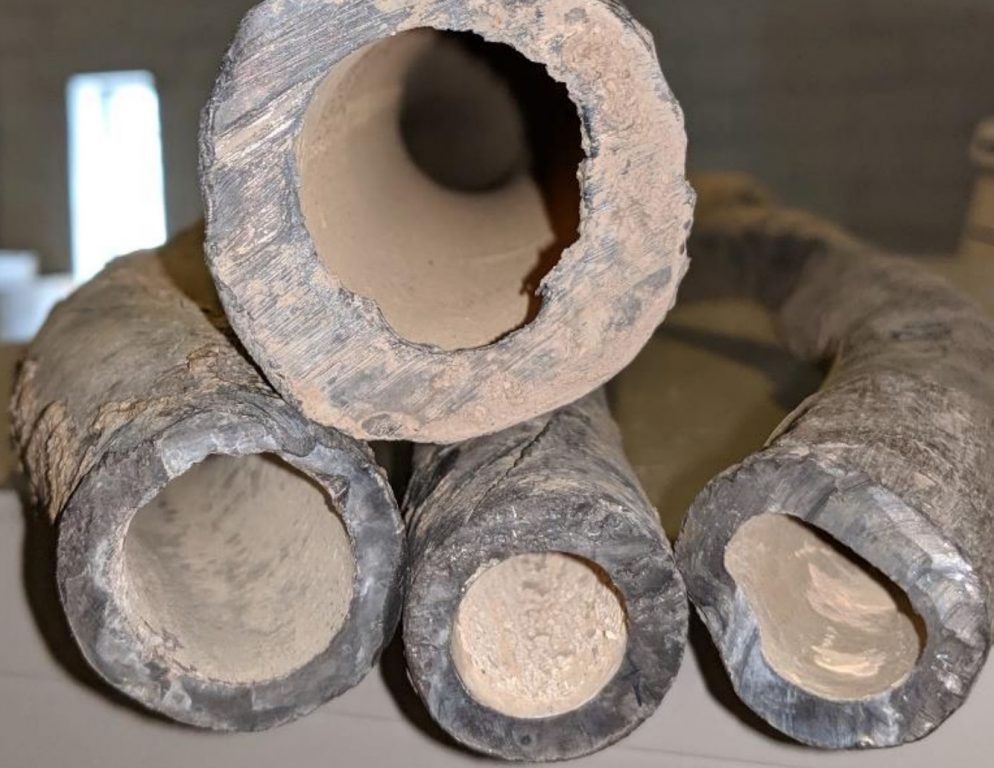Federal Water Infrastructure Spending Needed
In Wisconsin could be used to replace lead service lines and improve sewerage systems.

Lead service lines replaced by the Milwaukee Water Works with corrosion control visible in pipe. Image from Milwaukee Water Works.
Wisconsinites proved our resilience in 2020. The pandemic put stress on our community, but we continued to persevere. Now, as we are starting to return to a brighter horizon, it’s time to take stock of what our priorities should be in a post-pandemic world. Clean water needs to be high on the list.
However, getting to clean water will require fixing our infrastructure. We still have billions of gallons of sewage overflows and runoff pollution contaminating where we swim. In 2019, authorities tested 61 Wisconsin beaches and found that they had potentially unsafe levels of fecal bacteria at least one day during the year. South Shore Beach in Milwaukee was potentially unsafe on 19 days, which was more than any other beach in the state.
Lead in our drinking water is an equally persistent problem. We still have an estimated 240,000 lead service lines across Wisconsin, including an estimated 70,000 in the city of Milwaukee alone. Nationwide, there are an estimated 9 million toxic pipes, but we need to do more work to identify the actual number. These toxic pipes are contaminating our water with a potent neurotoxin that damages our children’s health. They’ve got to go.
To build a better future, we need an ambitious and bold infrastructure package. President Biden and Chairman DeFazio have put out good roadmaps. If we want our lakes and beaches to be safe for swimming, then Congress should, as a start, fully fund the Sewer Overflow and Stormwater Reuse Municipal Grants program and ramp up the Clean Water State Revolving Fund to $8 billion this year. And if we want lead-free water for our children, then we’ll need to provide the $45 billion proposed in President Biden’s American Jobs Plan to replace all the lead pipes across the country.
Finally, we need to make sure this funding is accessible to all communities, no matter their income or size. This can be done by setting aside water infrastructure funding for grants rather than loans, which would allow communities to access federal funds without fear of having to take out loans that they cannot afford to pay back.
We have a once in a generation opportunity to secure clean water for America. Let’s do it.
Congresswoman Gwen Moore has represented the 4th District in Congress since 2005. Megan Severson is the State Director of Wisconsin Environment.
More about the Lead Crisis
- Gov. Evers Signs New PFAS, Lead Regulations - Danielle Kaeding - Mar 2nd, 2026
- City Receives $400,000 Grant For Lead Screening - Sophie Bolich - Feb 24th, 2026
- Rep. Madison Proposes Restoring Local Control Over Lead Inspections - State Rep. Darrin Madison - Jan 6th, 2026
- $43 Million Later, MPS Says Classrooms Are Safe From Lead Dust - Corrinne Hess - Dec 18th, 2025
- MPS Buildings Cleared of Lead-Paint Risks after 10-Plus Months of Work - Milwaukee Public Schools - Dec 17th, 2025
- Wisconsin Moves to Require Lead Service Lines Replaced By 2037 - Danielle Kaeding - Dec 11th, 2025
- Gov. Evers, DNR Announce More Than $159 Million to Ensure Clean, Safe Drinking Water for Wisconsinites in 29 Municipalities - Gov. Tony Evers - Dec 10th, 2025
- EPA Announces $3 Billion in New Funding for States to Reduce Lead in Drinking Water - U.S. Environmental Protection Agency - Nov 25th, 2025
- Wisconsin Communities Get $282 Million for Drinking Water Projects - Danielle Kaeding - Nov 19th, 2025
- MKE County: County Launches Lead Abatement Program - Graham Kilmer - Nov 9th, 2025
Read more about Lead Crisis here
Op-Ed
-
Wisconsin Candidates Decry Money in Politics, Plan to Raise Tons of It
 Dec 15th, 2025 by Ruth Conniff
Dec 15th, 2025 by Ruth Conniff
-
Trump Left Contraceptives to Rot; Women Pay the Price
 Dec 8th, 2025 by Dr. Shefaali Sharma
Dec 8th, 2025 by Dr. Shefaali Sharma
-
Why the Common Council’s Amended Budget is Good Policy for Milwaukee
 Nov 20th, 2025 by Alds. Marina Dimitrijevic and Russell W. Stamper, II
Nov 20th, 2025 by Alds. Marina Dimitrijevic and Russell W. Stamper, II




















